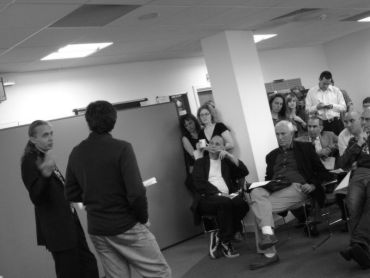Social and informal situationSERGEI Guz, President of the Independent Media Union of Ukraine, joined us as a guest in the "social and informal situation" of the London Freelance Branch (LFB) party at Headland House on 10 July.
Sergei was in town to meet NUJ national officials, and dropped in to meet the freelances just before going off to Dorset for the Tolpuddle Martyrs commemoration. Sergei said that his visit had given him "Useful experiences here... which have a secondhand application in Ukraine." As the drink and samosas flowed freely, Sergei (through the translation offices of the LFB's own Simon Pirani) told the Branch about conditions for Ukranian freelances. "Freelance (which in Ukrainian is freelancer) is a new status, there's a discussion about who is and who isn't a freelance." The Independent Media Union's freelance bureau, which started in September last year, now has 100 members and its own LFB-inspired Rates for the Job website. More and more people are turning freelance... it's independent from any employer, but it's very difficult. There are almost no rights. Developing authors' rights (copyright) is the first priority. A large proportion of freelance pay is "black", untaxed, in plain brown envelopes. In ninety-nine per cent of cases no agreement is written down. It is not unusual for journalists to send articles and when they are published to be paid less than agreed, or even nothing. There is a new rates structure in place, the problem is that employers don't take any notice of the law." An NUJ handbook on freelance rights has already been translated for use by the union in Ukraine, with added information relevant to the Ukrainian situation. "Only now is real trade union activism starting in Ukraine as they realise the market economy bring higher wages - but also a lot of problems," Sergei said: "Now they really have to fight for workers' rights, they have to learn a lot all over again." The International Federation of Journalists accepted the Independent Union as full members several weeks ago. As well as Sergei's Independent Media Union, there is also a Union of Workers of Culture, an old Soviet era union whose main task used to be to distribute tickets for state-owned holiday homes in the summer. In Sergei's words, "They donít do very much and seem to have very good relations with the employers. Our principle is to create and independent union. There are 1500 members in our (new) union, the Union of Workers of Culture has 7000. There's also a Soviet-era Professional Association for journalists (not a trade union) which has 14,000 members" including Sergei. Sergei estimates there are 30,000 to 50,000 journalists in Ukraine, working for 740 state-owned newspapers, 20,000 independent periodicals, 1200 radio stations and 30 state TV channels. The eight big private TV stations are owned by "oligarchs", politically-engaged businessmen. |
||
 Ukraine contacts from IFJ
Ukraine contacts from IFJ
|
![[Go to NUJ.LFB home] [NUJ.LFB home]](../gif/nujsma.gif) ![[about CRA] [about CRA]](../gif/ccc1.gif)
|
The Freelance editor is elected by London Freelance Branch and responsibility for content lies solely with the editors of the time
Send comments to the editors: editor@londonfreelance.org
![[Go to contents page] [The Freelance: contents]](../gif/fl1.gif)
![[The Freelance, newsletter of London Freelance Branch NUJ] [Freelance]](../gif/n1off.gif)
